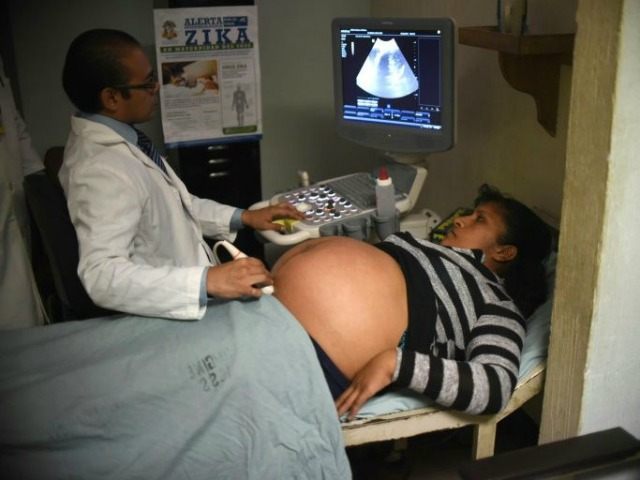The U.S. Centers for Disease Control (CDC) have confirmed that six infants have been born in U.S. states with birth defects following their mother’s infection with the Zika virus. 234 women in the continental United States have tested positive for Zika.
In addition to those cases in the continental U.S., the CDC says it has identified 189 cases of Zika virus among pregnant women in U.S. territories, most in Puerto Rico.
CDC officials released the number Thursday, though with little more information necessary to understand the danger Zika poses to American women who are or may become pregnant. For example, they did not mention how many of those six born with birth defects were diagnosed with microcephaly — a condition in which an infant’s skull is too small for his or her brain, crushing the brain — or other Zika-related conditions. They also did not note how many of those pregnant women had given birth already, leaving many to wonder what percentage of those infants born to mothers with Zika those six cases represent.
Of these six cases, three either miscarried or aborted.
“We can’t provide a lot of information about where these women are in their pregnancy. We don’t want to inadvertently disclose information about difficult decisions these women are making about their pregnancies,” CDC representative Dr. Denise J. Jamieson told the New York Times. Some women who are told they are carrying the Zika virus may choose to abort their children, leaving the outcome of that affected pregnancy a mystery.
The CDC did note that a number of the cases in which a child was born with microcephaly to a mother carrying the Zika virus occurred despite the mother not having any Zika symptoms.
The Zika virus poses a largely unknown threat in populations in which it circulates widely. In most adults — 80 percent — the virus is completely asymptomatic. In those who suffer Zika symptoms, they may record rashes, mild fevers, conjunctivitis, and mild muscle aching.
In a minority of adults, Zika has been linked to the development of Guillain-Barré Syndrome (GBS), a condition which causes extreme muscle pain, paralysis, and death. GBS is treatable, though many have died in Latin America, particularly Venezuela, due to a lack of access to proper medical treatment.
The greatest threat the strain of Zika currently prevalent in Latin America has posed to people has been to the unborn. Scientists have confirmed that Zika can cause microcephaly in infants, as well as a host of other abnormalities, including diminished sight and hearing, among others. Tracking whether a pregnant woman is exposing their child to Zika is difficult, as many women do not exhibit any symptoms of carrying the virus.
Tom Frieden, the director of the CDC, has warned that the number of Zika cases in the northern hemisphere are expected to skyrocket as summer arrives. Zika is carried by the aedes aegypti mosquito, which requires hot and humid climates to survive. Frieden predicted on Thursday that “dozens or hundreds of infants” may be born with microcephaly in Puerto Rico as its climate is especially appealing to mosquitos. Puerto Rico has already recorded 1,700 cases of Zika infection this year.
Experts are warning that Zika may become a global threat following the Summer Olympics, expected to take place this August in Rio de Janeiro, Brazil. Brazil has registered over 3,000 microcephaly cases and is considered the epicenter of the current Zika epidemic. “An unnecessary risk is posed when 500,000 foreign tourists from all countries attend the Games, potentially acquire that strain, and return home to places where it can become endemic,” a letter signed by over 150 medical experts warned. The letter, released in May, demanded the Olympics be postponed or relocated to a lower-risk region, lest tourists spread the virus globally.
Olympic officials have denied that Zika is a threat and asserted that the games will take places as planned. The International Olympic Commission is basing its decision on the World Health Organization’s (WHO) recommendation. “The Committee concluded that there is a very low risk of further international spread of Zika virus as a result of the Olympic and Paralympic Games as Brazil will be hosting the Games during the Brazilian winter,” the WHO said of the decision this week.

COMMENTS
Please let us know if you're having issues with commenting.